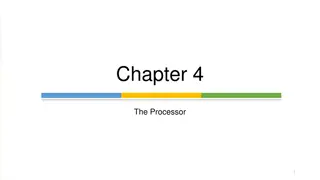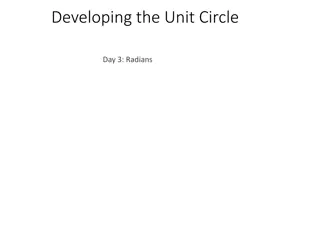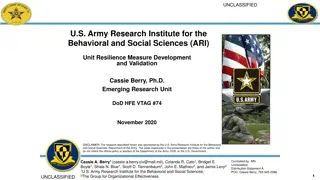
Importance of Research Ethics and Its Impact
Explore the significance of ethical decision-making in research, the nature of research, and its crucial role in societal advancement. Discover the reasons why research is essential, from improving quality of life to advancing knowledge for the betterment of society.
Download Presentation

Please find below an Image/Link to download the presentation.
The content on the website is provided AS IS for your information and personal use only. It may not be sold, licensed, or shared on other websites without obtaining consent from the author. If you encounter any issues during the download, it is possible that the publisher has removed the file from their server.
You are allowed to download the files provided on this website for personal or commercial use, subject to the condition that they are used lawfully. All files are the property of their respective owners.
The content on the website is provided AS IS for your information and personal use only. It may not be sold, licensed, or shared on other websites without obtaining consent from the author.
E N D
Presentation Transcript
1.Locating ethics in research Learning outcomes We will develop an understanding of the nature of ethical decision-making and its role in research ethics. You will also acquire an appreciation of the nature of research and its regulation.
What is research? The following possible definitions of research: a systematic investigation to establish facts; an attempt to find out something in a systematic and scientific manner; a systematic investigation designed to develop generalisable knowledge;
a focused systematic study undertaken to increase new knowledge and understanding; a systematic study directed toward fuller scientific knowledge or understanding; the collection of information about a particular subject; an inquiry that involves seeking evidence to increase knowledge.
Why is research important? Several reasons might be given for viewing research as a valuable activity: Research has brought a better quality of life and increased welfare. We owe our present standard of living to the huge amount of research that has made it possible huge improvements in economic efficiency, health care and wellbeing only exist because of research, and it is reasonable to expect that this will only continue.
Huge numbers of lives have been saved. If we think about medical research in particular, huge numbers of lives have been saved by medical advances. Moreover, advances in our basic understanding of nutrition, sanitation and the environment have had a profound impact on life expectancy and the quality of life.
Knowledge may be good for its own sake. Finally, even where new knowledge has no real world applications we may still think that we are in some way enriched by understanding more about ourselves, the universe we live in and our relationship to it.
These reasons support two different arguments in favor of doing research, based on different accounts of the value of new knowledge. Argument 1: Extrinsically valuable Argument 2: Intrinsically valuable
Argument 1: The first is an ethical argument that builds upon the idea of the knowledge generated by good science as extrinsically valuable. On this view, research is valuable because of the benefits that the knowledge gained brings to society. This argument suggests that we ought to support and carry out research insofar as it has such benefits, and this should be weighed against the potential harms intended or accidental that might occur during research or as a result of the knowledge it generates.
Argument 2: As being valuable in itself independently of any further benefits resulting from its application. This rests on the notion that there is something valuable about understanding ourselves and the world around us, even if there is no practical application of that knowledge. This second justification provides a reason why research without any anticipated applications or direct benefits may nonetheless be ethical.
Codes of Ethics and legal constraints Ethical codes and guidelines are a means of establishing and articulating the values of a particular institution or society, and the obligations that it expects people engaged in certain practices to abide by.
Research ethics as a separate area of concern arose in order to address the ethical concerns arising from the conduct of research. Historically, the development of research ethics has been greatly influenced by examples of scandals and unethical research such as those described in the below slide.
Research ethics scandals In this section we will introduce some famous and less-well-known examples of research ethics scandals , and show how these have ultimately led to the establishment of the present system of independent ethics committees reviewing research. It should be noted that while the history of research ethics is often assumed to have begun with the scandals that took place in Nazi Germany, both unethical research and ethical regulation of research preceded those events.
Edward Jenners smallpox vaccine, England, 1796 This research involved injecting an eight-year-old child with pus from a cowpox infection and then deliberately exposing the child to smallpox to establish their acquired immunity. While a great step forward in the fight against smallpox, the exposure to risk this involved for the child would be unlikely to be condoned today.
Medical experimentation in Nazi Germany, 1939- 45 Experiments carried out on concentration camp prisoners included involuntary subjection to radiation, hypothermia, infection of research subjects with malaria and tuberculosis (TB), and many other unethical experiments, conducted without the consent of the research subjects, and often leading predictably to extreme pain, mutilation and death. These experiments led to the development of the Nuremberg Code in 1947, largely as a legal document to codify what was unethical about the Nazi research, but also as a code for future research. sterilization, to induce freezing
2.Consent Learning outcomes An increased knowledge of the important role that consent plays in research ethics. An awareness of the ways in which the requirement for valid consent follows from other fundamental moral concepts such as autonomy, dignity, harm- avoidance, and respect for persons.
How consent may follow from more fundamental moral principles The practical principle that research on competent adults should only proceed with their informed consent arguably follows from several of the more fundamental principles. These include: respect for autonomy; respect for dignity; respect for persons.
Arguably, each of these three respectprinciples generates a duty of non-interference, meaning that it would be wrong to do something to an autonomous person s body without his or her valid consent, whether this be for medical treatment, research, or any other purpose. This requirement may also apply (although perhaps less clearly and powerfully) to acquiring information about and/or observing an autonomous person. Similarly, one might claim that doing things to a person s body and/or observing the person without consent is (at least in some cases) a failure to respect the person s dignity.
The tripartite definition of valid consent In most cases getting consent from any human participants is a necessary part of conducting research ethically. However, just getting people to say yes to participation is rarely enough. The consent must also be of a sufficiently high quality: it must be valid. Thus, consents based on inadequate or inaccurate information, or resulting from coercion, or made by people unable to understand what they are signing up to, will not suffice, and research utilizing such consents will be ethically flawed.
While there are various different definitions of validconsent (also known as free and informed consent ) in circulation, most of these amount to the view that valid consent must include the following three elements: adequate information; voluntariness; competence.
4.Privacy and confidentiality Learning outcomes An understanding of the definition of both concepts that will allow you to grasp what privacy is and what confidentiality is. An appreciation of the ethical importance of privacy and confidentiality in research.
This chapter explores two important and related issues in research ethics: privacy and confidentiality. These are often seen in legal terms, with researchers being subject to constraints under various pieces of national and international legislation, as well as research ethics guidelines and professional codes.
What are privacy and confidentiality? Privacy The contemporary approach to the definition of privacy is that it is primarily about the protection of personal information. This view of privacy gives substantial weight to modern concerns such as data protection, whereby privacy is seen not only as preventing others from gaining information about ourselves that we would not wish them to have, but also as supporting a general desire to maintain control over information about ourselves that is stored elsewhere, such as on computer files.
Privacy is the protection of: control over information about oneself; control over access to oneself, both physical and mental; and control over one s ability to make important decisions about family and lifestyle in order to be self expressive and to develop varied relationships. These three elements are widely considered to be the most important aspects of privacy because of the way that breaches in these areas may affect us.
Confidentiality The concept of confidentiality is closely related to that of privacy, and in particular to the aspect of privacy concerning the protection of personal information. A basic definition of confidentiality can be given as follows. A owes a (prima facie) duty of confidentiality to B when: B (the subject) discloses to A (the researcher) information which B regards as confidential or secret; And A undertakes (implicitly or explicitly) not to reveal this information to anyone who does not already possess it.
Confidentiality is a duty that arises when someone has been granted access to information that would otherwise be kept secret. In such circumstances maintaining confidentiality protects the subject s interest in maintaining control over their personal information. A breach of confidentiality will therefore also be a violation of this informational aspect of privacy.
5.Balancing harms and benefits Although it is common to refer to the balancing of risk and benefit in relation to research ethics, this terminology is potentially misleading. A benefit is an actual outcome whereas a risk is a probability of a certain harm or cost. Benefits may be balanced against harms, while risks should be balanced against probabilities of certain benefits. The balancing undertaken by a researcher or ethics committee therefore needs to take account of both the magnitude of the potential harms and benefits and their probabilities.
Ethics and randomized controlled trials: As well as raising general issues about the relationship between harms, benefits and consent, this chapter s case study focuses attention on the specific ethical issues that arise in relation to randomized controlled trials.
Randomized controlled trials are a vitally important research tool. They are most widely used in clinical trials, but can also be used to assess interventions and practices in fields other than medicine, such as education, social services and the criminal justice system. RCTs can be used to test new or existing practices. They can provide evidence of an intervention s effectiveness (or ineffectiveness), safety, cost- effectiveness, and of the balance of benefits over harms in comparison with other treatments.
6.Justice in research The term 'justice is used in different ways. In a wide sense, it is used to refer to that part of ethics that concerns rights or obligations (or is enforceable),while narrower senses include distributive justice (which relates to fairness in the distribution burdens),retributive justice (the infliction of punishment), rectificatory justice (compensating or otherwise making amends for previous injustices) and procedural justice (use of fair procedures for decision- making). of benefits and and restorative






















